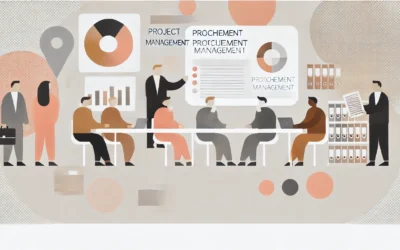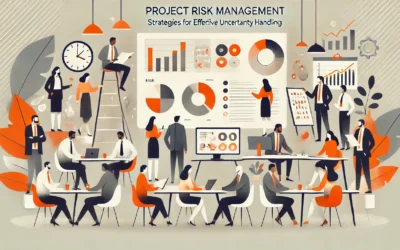Introduction
Resource Management is a crucial component of successful project execution, focusing on the effective planning, allocation, and utilisation of both human and physical resources throughout the project lifecycle. Recognised by the Project Management Institute (PMI) as one of the key Knowledge Areas, Resource Management provides a structured approach to ensuring that the right resources are available at the right time to complete project activities efficiently.
In this comprehensive guide, we will explore the key components of Resource Management, its significance in the project process, and practical strategies for project managers to implement it effectively. By mastering these techniques, managers can optimise team performance, reduce costs, and significantly increase the likelihood of project success.
Effective resource management isn’t just about assigning tasks; it’s about strategically aligning skills, tools, and materials with project objectives to maximise efficiency and productivity. As we navigate through the complexities of modern project execution, the ability to effectively manage diverse resources becomes increasingly crucial. This article aims to equip you with the knowledge and tools to excel in this critical aspect of project management.
What is Resource Management?
Project Resource Management involves the processes to identify, acquire, and manage the resources needed for successful project completion. This Knowledge Area focuses on both human resources (project team members) and physical resources (equipment, materials, and facilities). It encompasses several key processes: Plan Resource Management, Estimate Activity Resources, Acquire Resources, Develop Team, Manage Team, and Control Resources.
Effective Resource Management is essential for maintaining project timelines, controlling costs, and ensuring that the project team has the capacity and capability to deliver project objectives. It involves various methodologies and tools designed to optimise resource allocation, enhance team performance, and manage physical assets efficiently throughout the project lifecycle. In today’s dynamic project environments, where resources are often constrained and shared across multiple initiatives, resource management has become a key factor in project success and organisational efficiency.
This aspect of project management is not a one-time effort but a continuous process that runs from project initiation to closure. It requires a deep understanding of project scope, timelines, skill requirements, and organisational capabilities. Project leaders must be adept at balancing resource needs with availability, managing competing demands for resources, and fostering a high-performance team culture.
Moreover, Resource Management extends beyond just allocating people and materials to tasks. It involves strategic decision-making about skill development, team building, conflict resolution, and optimising the use of physical assets. By fostering a resource-conscious culture within the project team, managers can ensure that resource considerations are integrated into every aspect of the project, leading to more efficient project execution and better outcomes.
Key Components of Resource Management
Plan Resource Management
Plan Resource Management is the process of defining how to estimate, acquire, manage, and utilise physical resources and team members. This process results in a resource management plan that outlines:
- Roles and responsibilities within the project
- Project organisation charts
- Staff management plan
- Resource identification methods
- Training needs
- Team development approach
- Resource control processes
A well-developed resource management plan ensures that all team members understand how resources will be managed throughout the project. It serves as a roadmap for resource-related activities, providing clarity and direction to all involved parties.
The planning process also involves identifying potential resource risks and developing mitigation strategies. This might include addressing issues like resource constraints, skill gaps, or competing demands for resources across multiple projects. By anticipating and planning for these challenges, project managers can ensure more consistent resource availability and utilisation throughout the project.
Estimate Activity Resources
Estimating Activity Resources involves determining the type and quantities of resources required for each project activity. This process includes:
- Identifying the resources (people, equipment, materials) needed for each activity
- Determining the quantity of each resource required
- Considering resource availability and constraints
- Balancing resource requirements with project constraints (time, budget, quality)
Accurate resource estimation is crucial for developing realistic project schedules and budgets. It requires a thorough understanding of the project scope, deliverables, and the specific requirements of each activity.
Resource estimation should be an iterative process. As the project progresses and more detailed information becomes available, estimates should be refined to improve their accuracy. This ongoing refinement helps in maintaining the project’s resource efficiency and informs decision-making throughout the project lifecycle.
Acquire Resources
Acquiring Resources involves obtaining the team members, facilities, equipment, materials, and other resources necessary to complete project work. This process includes:
- Negotiating with functional managers or other organisations to secure resources
- Pre-assigning resources based on prior commitments
- Acquiring resources from external sources when necessary
- Considering virtual team options for distributed projects
Effective resource acquisition ensures that the project has access to the necessary talent and tools to achieve its objectives. It requires strong negotiation skills, as project managers often need to compete for limited resources within an organisation.
The acquisition process should also consider the long-term needs of the project. While immediate resource needs are important, project managers should also plan for future resource requirements to ensure continuity and avoid delays. This may involve strategies such as phased resource acquisition or creating resource pipelines to ensure a steady supply of necessary resources throughout the project lifecycle.
Develop Team
Developing the Team focuses on improving the competencies, team interaction, and overall team environment to enhance project performance. This involves:
- Enhancing knowledge and skills of team members
- Improving team dynamics and collaboration
- Building trust and cohesion within the team
- Establishing clear team norms and ground rules
- Implementing reward and recognition systems
Team development is crucial for maximising the productivity and effectiveness of project resources. It’s an ongoing process that requires attention throughout the project lifecycle.
Effective team development strategies might include team-building activities, training programs, mentoring arrangements, and creating opportunities for collaborative problem-solving. The goal is to create a high-performance team that can work efficiently and effectively towards project objectives.
Manage Team
Managing the Team involves tracking team member performance, providing feedback, resolving issues, and managing changes to optimise project performance. This includes:
- Monitoring team performance and providing timely feedback
- Identifying and addressing conflicts within the team
- Updating resource plans based on performance assessments
- Recommending recognition and rewards for high performance
- Facilitating problem-solving and decision-making
Effective team management ensures that resources are utilised efficiently and that the team remains motivated and focused on project objectives. It requires strong leadership skills, including the ability to communicate effectively, motivate team members, and address performance issues constructively.
Team management also involves managing the work environment to support team performance. This might include addressing issues like work-life balance, managing workload stress, and ensuring that team members have the tools and support they need to perform their roles effectively.
Control Resources
Controlling Resources involves monitoring the utilisation of project resources, identifying variances from the resource management plan, and taking corrective action when necessary. This process includes:
- Monitoring resource utilisation against the plan
- Identifying resource over-allocation or under-utilisation
- Implementing resource optimisation techniques
- Managing changes to resource allocation
- Updating resource forecasts and plans
Resource control helps maintain the balance between resource availability and project demands, ensuring optimal resource utilisation throughout the project lifecycle. It involves regular monitoring and analysis of resource usage, as well as the flexibility to adjust resource allocations as project needs evolve.
Effective resource control also involves managing physical resources efficiently. This might include tracking equipment usage, managing inventory levels of materials, and ensuring that facilities are used effectively. By optimising the use of both human and physical resources, project managers can control costs and improve overall project efficiency.
Importance of Resource Management
Effective Resource Management is crucial for project success for several reasons:
- Optimal Resource Utilisation: Proper resource management ensures that resources are used efficiently, maximising productivity and minimising waste. This leads to better cost control and improved project performance. By aligning the right resources with the right tasks at the right time, project managers can ensure that work is completed efficiently and to the required quality standards.
- Enhanced Team Performance: Good resource management practices contribute to building and maintaining high-performance teams. By focusing on team development, skill enhancement, and effective team management, project managers can improve overall team productivity and morale. This focus on team performance can lead to better project outcomes, increased innovation, and higher levels of stakeholder satisfaction.
- Improved Project Planning and Scheduling: Accurate resource estimation and allocation are crucial for developing realistic project schedules and budgets. Effective resource management provides the foundation for reliable project planning. By understanding resource capabilities and availability, project managers can create more accurate timelines and avoid overcommitting resources, which can lead to delays and budget overruns.
- Risk Mitigation: Resource management plays a crucial role in project risk management. By identifying potential resource constraints or skill gaps early, project managers can develop strategies to mitigate these risks. This proactive approach to resource-related risks can help prevent project delays, quality issues, and budget overruns.
- Increased Flexibility and Adaptability: Good resource management practices enhance a project’s ability to adapt to changes. By having a clear understanding of resource capabilities and availability, project managers can more easily adjust to changing project requirements or unexpected events. This flexibility is particularly valuable in today’s fast-paced and often unpredictable project environments.
- Cost Control: Efficient resource management directly contributes to cost control. By optimising resource allocation and utilisation, project managers can avoid unnecessary costs associated with idle resources or last-minute resource acquisition. Moreover, by developing and retaining skilled team members, organisations can reduce costs associated with frequent hiring and training.
- Stakeholder Satisfaction: Effective resource management contributes to meeting project objectives on time and within budget, which is key to stakeholder satisfaction. It also ensures that the right skills are available to deliver high-quality project outcomes. By demonstrating efficient use of resources, project managers can build trust with stakeholders and enhance the project’s and organisation’s reputation.
Practical Tips for Effective Resource Management
Develop a Comprehensive Resource Management Plan
Create a detailed plan that outlines how resources will be estimated, acquired, managed, and optimised throughout the project lifecycle. This plan should be tailored to the specific needs of your project and align with organisational policies. Start by identifying all resource-related processes and tools, then map out how these will be applied throughout the project.
Remember that a good resource management plan is both thorough and adaptable. As the project progresses and resource needs evolve, be prepared to refine your approach. Regularly review and update your strategy to ensure it remains relevant and effective throughout the project.
Implement Resource Levelling Techniques
Utilise resource levelling techniques to optimise resource allocation and prevent over-allocation. This may involve adjusting project schedules or redistributing work to balance resource utilisation. Consider using project management software that includes resource levelling features to assist in this process.
Be mindful of the potential impact of resource levelling on project timelines. Always assess the trade-offs between resource optimisation and schedule impacts when making levelling decisions.
Utilise Skills Matrices and Resource Calendars
Develop and maintain skills matrices for your team members to understand the range of skills available and identify any skill gaps. Use resource calendars to track availability, including factors like holidays, part-time schedules, and commitments to other projects.
These tools can help in making informed decisions about resource allocation and identifying areas where additional training or resource acquisition may be necessary.
Foster a Collaborative Team Environment
Encourage collaboration and knowledge sharing within the project team. This can lead to more efficient resource utilisation and improved problem-solving capabilities. Consider implementing collaborative tools and platforms to facilitate teamwork, especially for distributed teams.
Regular team meetings, both formal and informal, can help build team cohesion and provide opportunities for sharing insights and addressing challenges collectively.
Implement a Resource Management System
Leverage technology to streamline resource management processes. Implement a robust resource management system that allows for real-time tracking of resource allocation, utilisation, and performance. This can provide valuable insights for decision-making and help in identifying potential resource conflicts early.
Ensure that your chosen system integrates well with other project management tools and provides the level of detail required for effective resource management. Train your team in the use of these tools to maximise their effectiveness.
Regularly Review and Adjust Resource Allocations
Conduct regular reviews of resource allocations and utilisation. Be prepared to adjust allocations based on changing project needs and performance assessments. This might involve reallocating resources between tasks, bringing in additional resources, or adjusting workloads to optimise team performance.
Remember that resource needs can change as the project progresses. Stay flexible and be prepared to make data-driven decisions about resource allocation throughout the project lifecycle.
Invest in Team Development
Prioritise ongoing training and development for team members. This can improve resource efficiency and contribute to project success. Consider both technical skills training and soft skills development, such as communication and leadership training.
Implement mentoring programs or peer learning initiatives to facilitate knowledge transfer within the team. This can help in building a more versatile and resilient project team.
Manage Resource Conflicts Proactively
In multi-project environments, resource conflicts are often inevitable. Develop clear processes for managing these conflicts, including escalation procedures when necessary. Foster good relationships with other project managers and functional managers to facilitate smooth resolution of resource conflicts.
Consider implementing a centralised resource pool or a project management office (PMO) to help manage resources across multiple projects more effectively.
Balance Workloads and Prevent Burnout
Pay attention to individual workloads and take steps to prevent team burnout. This might involve rotating high-stress tasks, ensuring adequate time off, and providing support for work-life balance. Regular check-ins with team members can help in identifying potential burnout situations early.
Remember that an overworked team is likely to be less productive and more prone to errors. Balancing workloads effectively can lead to better long-term performance and higher team morale.
Learn from Historical Data
Leverage data from past projects to inform your resource management strategies. Analyse historical data on resource utilisation, productivity, and project outcomes to identify trends and best practices. Use this information to refine your resource estimation and allocation processes for future projects.
Consider creating a knowledge base of resource management lessons learned that can be shared across your organisation. This can help in continually improving resource management practices and avoiding common pitfalls.
Conclusion
Resource Management is a critical aspect of successful project execution. By developing and implementing effective resource management strategies, project managers can ensure optimal utilisation of both human and physical resources, leading to improved project performance, cost control, and higher chances of project success.
The key to effective Resource Management lies in understanding that it’s not just about allocating people and materials to tasks, but about strategically aligning resources with project objectives to maximise efficiency and productivity. By leveraging a mix of thorough planning, strategic allocation, ongoing development, and proactive management, you can create a project environment where resources are utilised effectively and team performance is optimised.
Remember that resource management is not a one-size-fits-all approach. As you apply the strategies and tips outlined in this article, tailor them to your specific project needs and organisational context. With practice and dedication, you can master the art of project Resource Management and significantly enhance your overall project management effectiveness.
Stay tuned for more detailed articles on each of the Project Management Knowledge Areas, where we will explore best practices, practical tips, and advanced techniques to help you excel in your project management career.






0 Comments